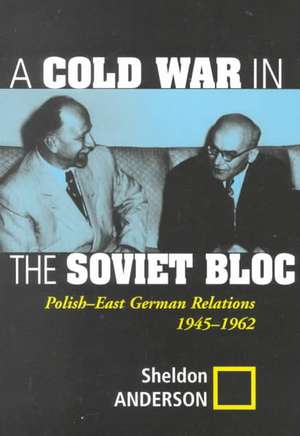A Cold War In The Soviet Bloc: Polish-east German Relations, 1945-1962
Autor Sheldon Andersonen Limba Engleză Paperback – dec 2000
| Toate formatele și edițiile | Preț | Express |
|---|---|---|
| Paperback (1) | 469.34 lei 6-8 săpt. | |
| Taylor & Francis – dec 2000 | 469.34 lei 6-8 săpt. | |
| Hardback (1) | 1000.27 lei 6-8 săpt. | |
| Taylor & Francis – 13 iun 2019 | 1000.27 lei 6-8 săpt. |
Preț: 469.34 lei
Nou
Puncte Express: 704
Preț estimativ în valută:
89.84€ • 97.62$ • 75.51£
89.84€ • 97.62$ • 75.51£
Carte tipărită la comandă
Livrare economică 22 aprilie-06 mai
Preluare comenzi: 021 569.72.76
Specificații
ISBN-13: 9780813337838
ISBN-10: 0813337836
Pagini: 336
Ilustrații: Illustrations, 1 map
Dimensiuni: 156 x 234 x 19 mm
Greutate: 0.45 kg
Ediția:New.
Editura: Taylor & Francis
Colecția Routledge
Locul publicării:Oxford, United Kingdom
ISBN-10: 0813337836
Pagini: 336
Ilustrații: Illustrations, 1 map
Dimensiuni: 156 x 234 x 19 mm
Greutate: 0.45 kg
Ediția:New.
Editura: Taylor & Francis
Colecția Routledge
Locul publicării:Oxford, United Kingdom
Cuprins
Introduction , There Are No Good Germans: The Myth of Proletarian Internationalism, 1945–1949 , The Controversy over the Oder-Neisse Border, 1946–1949 , The Myth of the Stalinist Brotherhood, 1949–1954 , The Problems of German Repatriation, Reparations, and Trade, 1945–1953 , German Remilitarization and the Polish Thaw, 1954–1955 , Khrushchev's De-Stalinization Speech and Gomu?ka's Return to Power, January–October, 1956 , The Cold Winter of Polish–East German Relations, 1956–1957 , Gomu?ka's Trade Policies and the Recurring Problem of German Repatriation, 1953–1957 , Gomu?ka's Foreign Policy and the Ulbricht-Gomu?ka Summit, 1956–1957 , The Rapacki Plan and the German Question, 1957–1959 , The Right Road to Socialism and Ulbricht's Visit to Poland, 1958–1959 , The GDR as a Model for Polish Socialism, 1959–1961 , The Berlin Wall and the Détente in Polish–East German Relations, 1961–1962 , Conclusion
Descriere
This book explores the Polish and East German communist parties' pursuit of conflicting national interests--rather than common socialist goals--during the height of the Cold War, and how this weakened the unity of the Soviet bloc.










